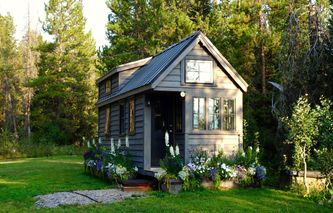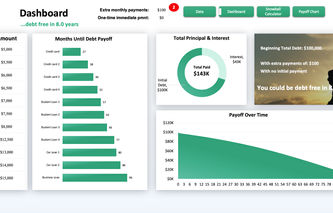Latest Home Buying Guides
The renewed faith in the American economy and housing market that came to a screeching halt in 2019 picked up again 2020, resulting in an increase in the selling price of homes over the past year.
Our guide to buying a home aims at being a great source of information for both the first time home buyer and those thinking about a second home. We'll take you through the entire process: from figuring out how large a mortgage you can afford, right through your closing. We'll explain it all to you in simple terms, which should remove the mystery around buying a home.
Maybe you have a new job, got married, or retired; perhaps the home is too small for a growing family, or too big for empty nesters. These are just a few of life's events that have people wondering: How much house can I afford?
Buying a home is a big financial step. Buyers typically need to borrow money to finance the purchase, which is a serious financial commitment to the mortgage company. But to really appreciate the total cost of owning a home, buyers need to look beyond their mortgage.
According to data published by the Census Bureau, nearly five million homes are sold each year in the United States. For many Americans, buying a home is the single largest investment they will make in their life. It's a decision that affects personal finances as well as lifestyle.
When the Department of Housing and Urban Development (HUD) was created back in 1968, their objective was to help manage federally-subsidized housing, and develop new communities in urban areas.
Work hard, play hard; we've all heard that expression. More than ever before, people are buying a second home along coastal towns and resort communities.
Picture this... a buyer is working with their real estate agent, and they find the perfect home, at a great price, in the ideal location. They're determined to close on the deal, but there is one obstacle standing in their way: the home inspection. After all, a good inspector is liable to figure out the perfect house might not be so perfect.
Before buying a home, it's always a good idea to have it inspected by a professional. In fact, if planning to borrow money to help pay for this home, it is very likely the mortgage company, or lender, will require a home inspection.
You've finally found a dream home in your price range, and it's time to make an offer to buy the home. Your about to start one of the most tension-filled parts of the entire process: negotiating with sellers!
The final walk through inspection is conducted on the day a buyer closes on a home. Knowing what's important, and what to look out for, can save a good deal of grief, and money, later on.
Buying a new home is not an everyday event; it's one of those financial milestones that many of us look forward too. Unfortunately, we're not prepared for all of the jargon we encounter when closing on a home; and we usually only get one bit of insight from friends and relatives: closings are expensive.
While there is no doubt that buying a home is commonplace, it's also a complex financial transaction. As we explain some of the most common closing costs, it should be clear why it's an expensive process too.
Individuals new to the home buying marketplace may be introduced for the first time to the concept of escrow. In fact, when buying a new home, the money placed in an escrow account is oftentimes the largest expense associated with a home's closing cost.
Also referred to as NNN leases, the triple net lease is more common in commercial real estate than the residential market. It's an arrangement that places a good deal of financial burden on the tenant, so it's important for renters to understand the commitment they're making with this type of contract.
Buying a home is an important decision and it's a difficult one too; especially for first time home buyers. A new home is a big investment, and the choice is oftentimes one that lasts for years.
In the previous article in this series, we walked through a process that enables first time home buyers to estimate how much they can afford to pay for a new home. The next step in this process is to figure out where to live.
In the first two articles in this series, we explained how to calculate an affordable mortgage, and the factors to consider when choosing the home's location. In this third installment, we are going to discuss how to work with real estate agents.
In the first three articles in this series, we explained how to calculate an affordable mortgage, choose a home's location, and how to work effectively with a real estate agent. In this final article, we're going to talk about pre-qualifying for a mortgage, and what to look for when trying to evaluate a home's potential value.
Information concerning low cost first time home buyer loans is available through state and federal agencies in cooperation with private lenders. To speed up the process, these government agencies have preapproved lenders to work with home buyers.
Federal grants can be an important source of funding for the first time home buyer. Unlike a loan or mortgage, a grant does not have to be repaid, which means these programs are targeted to areas where the government wants to invest in the revitalization of a community.
There are many things we do for the first time... take a step, fall in love. But with today's home prices, it would be nice to make an informed purchase decision that we can look back on with no regrets. That's why first time home buyer programs are such an important source of information for anyone thinking about taking the plunge, and buying a home.
If the forces of supply and demand are heating up the local real estate market, buyers can't expect sellers to offer much in the way of incentives. But if the market has been cooling off, or homes are not selling quickly, sellers and builders alike will offer what are seemingly generous incentives.
Individuals thinking about buying a home, or even a new car, are oftentimes interested in seeing an amortization schedule for the loan. These schedules allow users to calculate, or visualize, what happens to the loan as time progresses.
Maybe you've overheard coworkers or friends talking about the great deal they got on a new mortgage, or perhaps a recent downward movement in interest rates has you wondering if it's the right time to refinance.
Anyone that's ever purchased a "used" home is familiar with the costs that are oftentimes needed to bring it up to modern standards. Financing these home improvements is an especially important topic to anyone buying a home that's a "fixer upper."
If you're thinking about starting a home remodeling project, then you're not alone. According to the Census statistics on residential improvements and repairs, Americans will spend nearly $60 billion on maintenance, and over $460 billion more on improvements, alterations, and replacements.
When the real estate market is booming, it leaves behind home values that are far greater than the price paid for them. Their owners are a direct beneficiary of this increase, and can realize a substantial growth in the equity they have in their homes.
There are a number of reasons why someone might wind up with bad credit; people make mistakes. They stretch too far when it comes to financial commitments, or experience an unfortunate run of bad luck such as losing a job. Regardless of the reason, many of these same individuals often wonder to themselves: Is buying a home with bad credit possible?
Families thinking about buying a new home may have considered working with a mortgage broker. Many borrowers believe mortgage brokers can lend a helping hand when it comes to finding the best deal on a loan. But as we'll see, a mortgage broker may not always have the borrower's best interests in mind.
There is no doubt that filing for bankruptcy can have a devastating impact on the ability to borrow money. This is especially true in the months and, sometimes years, immediately following a bankruptcy filing and settlement. But buying a home after bankruptcy in as few as 18 to 24 months is possible if the right steps are taken to rebuild creditworthiness.
There's a common misconception that adjustable rate mortgages are only for borrowers that can't afford a fixed rate mortgage. In fact, an adjustable rate mortgage, or ARM, can play an important role in the real estate market, especially to the savvy homeowner.
They're called pay option loans, pick a payment, and the somewhat less descriptive term Option ARMs. Regardless of the name, these innovative mortgages can save borrowers 30% or more on their monthly payments; but at what cost?
There are prime loans, subprime loans, and somewhere in between is the Alt-A loan. This type of mortgage is considered riskier than an A-paper loan (prime), but not quite as risky as a subprime loan; which is generally considered the riskiest type of mortgage a lender can write.
Financial hardships, such as the sudden loss of a job, can often force homeowners to delay payments on their monthly mortgage. Unfortunately, when a homeowner starts to fall behind on their payments, they run the risk their lender may try to foreclose on their home.
Individuals interested in putting their home to work can choose from one of several equity release strategies, which allows homeowners to use the money invested in their home to provide a steady source of income.
These homes go by many names: manufactured homes, prefabricated homes as well as mobile homes. Regardless of what they're called, these are state-of-the-art dwellings. The energy efficiency, structural soundness, and overall appearance of these houses get better every year.
The prefabricated home market is large. To put things in perspective, new home sales reached just over $9 billion in 2019. With that many manufactured homes being sold each year, it's quickly becoming an important and significant market for both new and used homes.
At one time, the only type of prefabricated home that could be purchased was a house trailer. As the industry grew, so did the size of the homes. They were called mobile homes starting in the 1950's, when buying one was extremely popular, and competition was fierce. Today, the mobile home has evolved quite a bit from its humble beginnings, and the offerings are just as surprising.
They're referred to as trailer homes, mobile homes, manufactured housing, and modular homes. The common thread is this: these structures are prefabricated. All or a portion of the home is manufactured elsewhere and transported to a site selected by the buyer.
No matter how slow the housing market might seem, it's always possible to sell a home. If anyone ever complains they can't sell their home, they're only telling half the story.
When the number of unsold homes increases, that's a sure sign of a slow real estate market. Buyers might have a wide selection from which to choose, but what if they're trying to sell your home in a slow market? There's a lot of money at stake when selling a home, so it's important to understand just how much an unsold home can cost.
There are a number of ways to make money in real estate. Today's marketplace has literally turned the rules upside down with a concept termed flipping houses.
In the real estate market today, and especially in a slow market, homeowners should take the time and effort to stage their home for sale. By following some fundamental real estate tips, it's possible to obtain the highest possible price for a home.
There's no doubt that everyone's seen one of these signs in front of a house or pointing down a street. Selling a home is a big step, and it involves a lot of money. In this article, we've a couple of tips that might come in handy for anyone thinking about putting a "For Sale" sign on their front lawn.
Buying a home and relocating a family can be an unsettling and bittersweet experience. A lot of planning goes into the move to make sure family members, cars, and furniture get to their new location in one piece. Moving the family pet can take just as much thought and planning as the other family members, sometimes more, for that reason, an ideal solution could be to find the right relocation service.
According to the National Fire Protection Association (NFPA), 97% of the homes in North America have at least one smoke alarm. Ironically, the NFPA statistics also state there are more homes with smoke alarms that are not working, than homes without alarms.
Buying a new home is always an exciting event. But for anyone with young children, there can be obvious, or even hidden, safety hazards in any new home. Buying a home is a big investment for kids, and the safety of family members is important too.
A great way to protect personal property, assets, and loved ones is by installing a home alarm system. There is considerable competition in this space and the offers from sellers of these systems can be quite attractive, which is good news for consumers.





.jpg)

